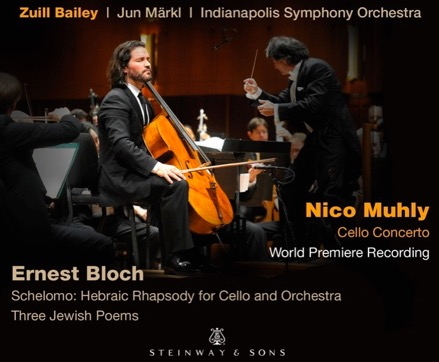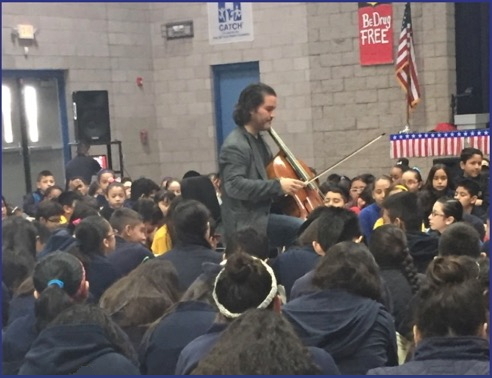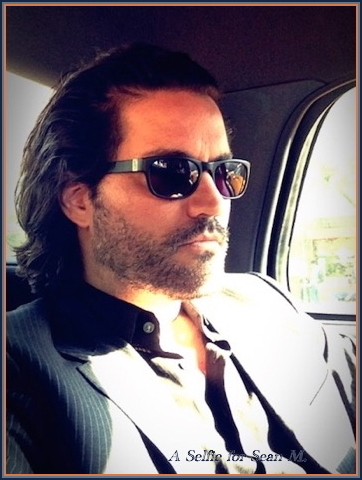Cellist Zuill Bailey's latest recording, Muhly & Bloch, combines the world premiere recording of Nico Muhly's Cello Concerto with Ernest Bloch's Schelomo and Three Jewish Poems. Jun Märkl conducted the Indianapolis Symphony Orchestra in this live recording taken from concerts held at the Hilbert Circle Theater, Indianapolis. Released by Steinway & Sons, the sound quality goes far beyond the notion of being there. It is more about sharing the artist's chair, being at one with his magnificent 1693 Matteo Gofriller cello, and reacting to the instruments surrounding you. "It's how my cello sounds when I'm actually playing it," said Mr. Bailey.
"I think this is one of the finest-sounding recordings I've ever heard. The acoustics are so off the charts - the way they've mapped out the orchestra and captured the cello within the fabric of that. The recording really showcases the unique sound my cello has - the bass growl, the soaring top, and the speaking element of the middle. It's one of the great cellos on earth and, being such an early one, it's huge - almost a church bass. That's what gives this cello its unique sound. It was used in the Budapest String Quartet for forty years. I got it at a very unique time in my career, right at the beginning. All of my recordings are on this cello. It has become my voice."
The theme of the entire project can be described as the finding of one's voice - beginning with the two composers. In creating Schelomo - Rhapsodie Hébraïque for Cello and Orchestra, composer Ernest Bloch draws upon Ecclesiastes 1:2-9, intending that the cello be the voice of King Solomon, son of David - caught up in a whirlwind of enlightenment, a holocaust of realization. All is vanity, there is nothing to be gained, nothing changes, nothing satisfies, what was - will be again, and nothing is new under the sun. The orchestra is the omnipresent Divine, the awesome force that knows Solomon's heart and the ponderous weight of his acquiescence.
Muhly & Bloch, performed and recorded between January 24-26, 2013, is Zuill Bailey's third collaboration with the Indianapolis Symphony Orchestra - the "bookend" as he calls it to the Dvořák and the Elgar cello concertos. His preparation for this American premiere of Muhly's piece began the preceding November, dovetailing with an isolated and heavy-duty workout on Benjamin Britten's Cello Symphony - also recorded live and performed two weeks later with the North Carolina Symphony Orchestra. Hovering in the air is the vexation of Solomon.
"Muhly's music has a very distinct structure. You can feel it going along and you can gauge the direction. But from the page, you don't see it that way. He has built tension in the counting and in the characteristics of the cello part. It's an intense study to try to understand how this works. On the other side, it sounds very natural, very simple. From the artist's standpoint and the presentation standpoint it is by no means simple. It is actually incredibly difficult and incredibly intricate. The difficulty was trying to figure out and to be comfortable and master a new language of a composer who is new to me - finding voices and textures that are new to everyone. Muhly has such a distinctive voice. I kind-of knew what he wanted because he was very explicit in his direction and he knows how to write for the cello. The wonderful part in all of this, is that he was there! How many times do we get to actually ask the person who wrote the music to guide us, as opposed to speculating about it? The goal with this U.S. premiere was to capture lightning in a bottle - and be lucky to have Muhly in attendance."
"Then it came back to what would be a good pairing for this piece. I've always dreamed a cellist's dream - after I've at least recorded the Dvořák - to record the Schelomo by Bloch. It's one of the great masterpieces of all time. It is underplayed and not prolifically recorded. I've always thought my cello could be the voice of the Schelomo - because the instrument is so masculine, almost Biblical in its colors and in its stature. So, I suggested the Schelomo. They said, 'That's it! That's perfect.' Then they decided to combine it with Bloch's Three Jewish Poems - which is the Indianapolis Symphony by itself. We did the recording and then, the following week, I did the Britten Cello Symphony recording. I was doing crazy repertoire - a brand new piece, along with the Britten, along with the Schelomo. It was quite a few weeks for me."
A week before the Bloch and Muhly events came a trial straight out of the Book of Job. Probably the consequence of zealous over-practicing, something went haywire with the third finger of Zuill's left hand. It went numb and stayed numb throughout the three-day engagement.
"My doctor said it was not a permanent injury, but that I needed to take some time off. I got very scared. It's the first time in my life that I felt my body might not always be with me to play the cello. But I played this concert. I'll never forget the feeling in the Schelomo. I was almost weeping - with every note, I felt that it could be my last. I kept looking down at my hand. The adrenalin was getting me through, but my body was essentially shutting down, saying, 'We need to stop.' I was sad, thinking, 'This is my last moment to express myself through this cello - this gorgeous Hebraic rhapsody.' I was in a spiritual kind of space - of accepting that this could very well be a possibility, this could be the last concert for a long time - or ever. And accepting that I have been so blest to have these opportunities and also terribly sad because I know things do come to an end and not necessarily when you want them to. As human beings, we have hope. But I didn't have a lot of hope that day. I just had a weight - on top of the fact that microphones were everywhere and the pressure was enormous. I didn't want to let anyone down as my body was letting me down. I'll never forget it. A real life moment. It would be the postcard that says, 'Thank you for letting me express myself through the cello of a lifetime.'"
And then the numbness passed. During this exchange with Zuill, I admitted to my own shock and awe at the near-Biblical parallels of his challenging adventure and that my renewed acquaintance and passion for the composers he has recorded is due entirely to his consummate artistry.
"When people trust an artist or musician - then they will explore other realms. We've talked about Britten, Daugherty, Bach, Brahms, Beethoven - it's all over the map. It's not one cut, where someone makes a career on one type of music. I'm trying to broaden myself. We all do it together. I have my own stories of artists I love - how they championed new pieces. And because of that, I got to know new composers and new sounds. And then, all of a sudden, comes this experience with the Bloch and Muhly - which I'm now sharing with my students. I talk about how life is fragile, how you have to channel what you've got in the time that you can. For me and in many ways, this CD put the picture in a larger perspective. It happened to be the perfect music to do so. I guess that was Fate being kind."


